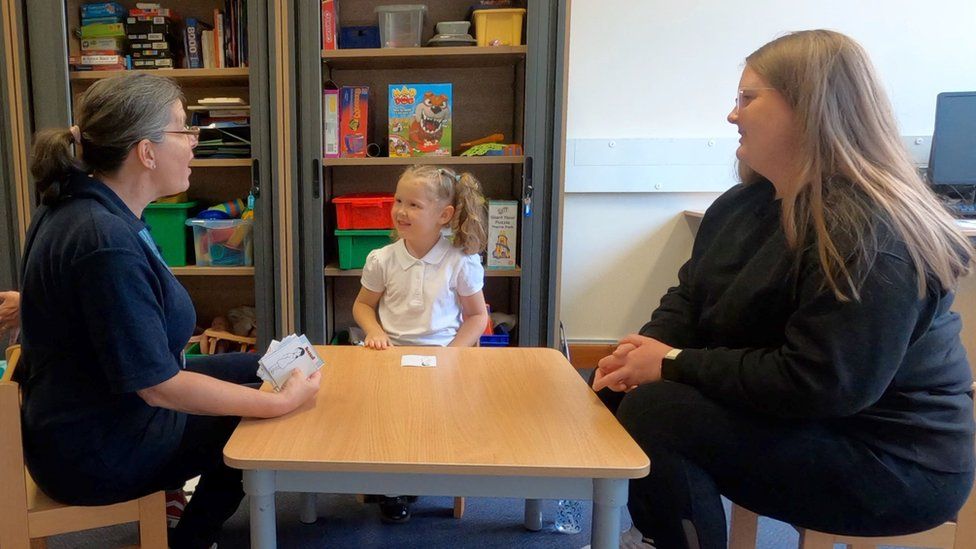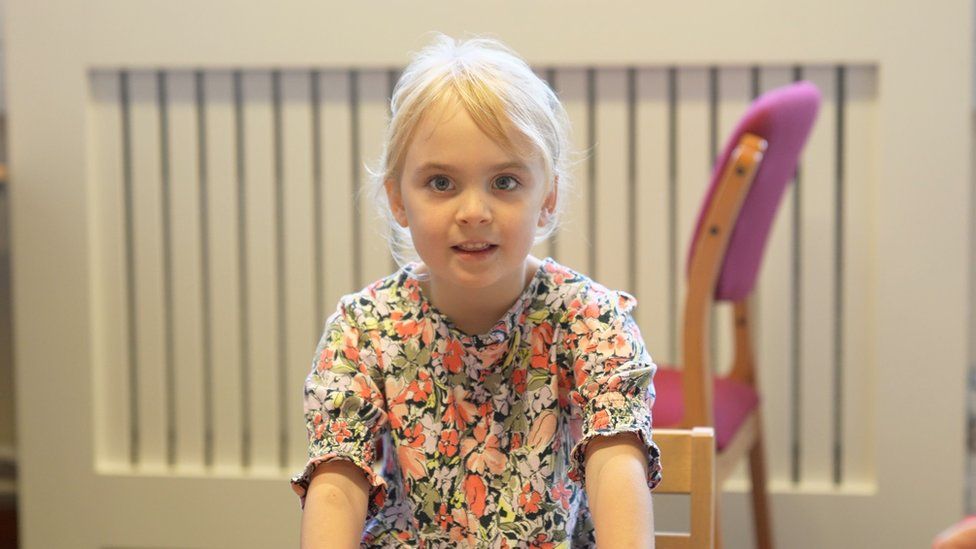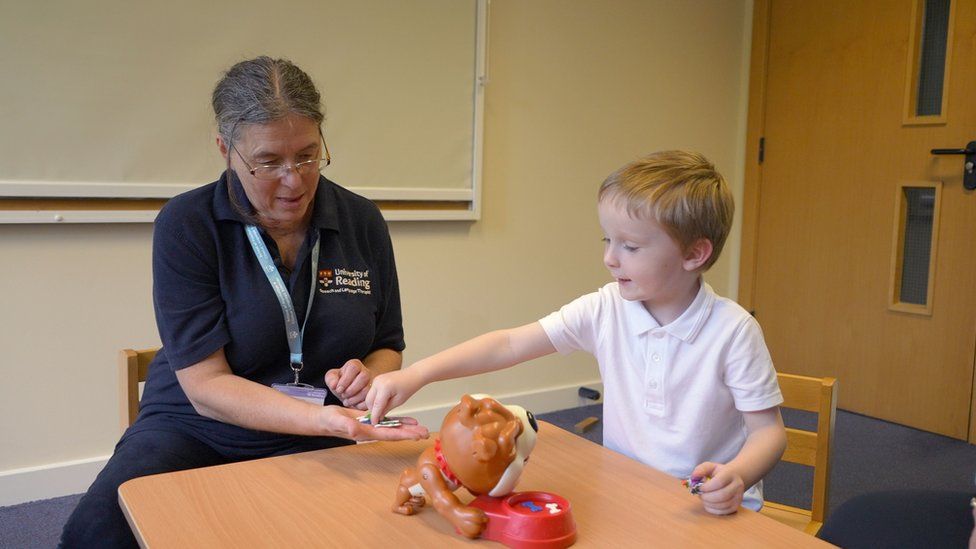The Covid kids starting school unable to speak
BY: Lucy Watkinson
SOURCE: BBC
PAGINA 100 COLOMBIA
When five-year-old Cali said the word “spider”, her mother, Cara, had tears in her eyes.
It was the first time she had ever heard her daughter clearly say a word.
Cali had always found it difficult to form sounds and words, but when she turned two during the Covid lockdown and her parents tried to find her help, it was nearly impossible to access NHS speech therapy services.
“The only appointment was over the phone, and they didn’t speak to Cali, they just spoke to me,” Cara says.
“I was told to try out some games, and that was the last contact I had with them before she started school last year.”
Without help, Cali would get frustrated because she could not make herself understood, and then started to have extreme tantrums in the classroom.
Cara heard about a speech and language unit at the University of Reading, where therapy is provided for free but observed by students.
When Cali first arrived here a year ago, all of her sounds started with a “y” – so if she was counting, Cali would say, “yun, yoo, yee, your…yait, yine, yen.”
But with help from the therapists she has made great progress.
“The improvement in her speech is huge,” Cara says. “What they have done has helped us so much.”

Children and young people on NHS waiting lists for speech and language therapy
- 65,057 in England
- 6.503 in Scotland
- 2,319 in Wales
- 4,527 in Northern Ireland
Source: Latest NHS figures
Data from health visitor checks in England for 2022-2023 shows nearly 15% of children aged 24 to 30 months were below the expected level in communication skills, a rise from 11% in 2018.
At the age of five, children with speech and language difficulties are six times less likely to achieve expected targets in English, and 11 times less likely to achieve maths targets by the end of primary school.
Eight out of 10 children with emotional and behavioural disorders have speech, language and communication needs that have not previously been identified.
Specialist centre
At the University of Reading speech therapy unit, places are limited and demand is high.
“We’re getting families phoning up in tears, saying, ‘we’re desperate, please can you see our child?’,” says Allie Biddle, director of speech and language. “It’s really hard to say ‘we’re sorry we can’t’.”
During the pandemic, she says accessing speech and language development services became increasingly challenging for parents whose children were struggling as many places closed down.
By the time services had moved online, long waiting lists had built up, meaning children like Cali were left behind.
“And unfortunately children’s development does not wait for Covid to go away,” Allie says.

Aldine and Adam’s five-year-old daughter Ivy is among those currently being helped by the clinic.
They say the stress of the pandemic and not being able to see friends and family took a big toll on Ivy. When the family went out for walks, Ivy wanted to go to talk to other children – but could not because of Covid restrictions.
“She had no interaction with anyone her own age, so that slowed down her development,” Aldine says.
“Ivy was frustrated and upset at being unable to communicate: she would either bang her head on the wall or hit herself. It was quite horrible.”
Aldine says the demands of home-schooling their two other children during Covid while also looking after Ivy meant “things fell by the wayside as a parent”, and she and Adam did not fully realise how compromised Ivy’s development had become.
“We know from all our research early intervention is key,” says Allie, “because you are trying to prevent the long-term impact on mental health, not just for the young child but for the family as well.”
In the past, she says the difficulties faced by children with speech delays were often able to be resolved quickly with minimum support from services like hers – but that has changed since the pandemic.
“We are seeing children who have got virtually all of their sound systems disordered,” she says. “We’ve seen a change in profile in our clinic.”
Ivy, who has now been diagnosed with speech dyspraxia, is having to unlearn the many inaccurate word patterns that she developed while learning to speak during the pandemic.
She has trouble sounding out “ch” and “g” sounds, and often gets them muddled up, so instead of saying “chair”, Ivy will say, “gair”.
Ivy’s new younger brother’s name, Barnaby, was deliberately chosen because it is one that Ivy can say without a problem – but she is making steady progress, and getting help has been “life-changing”, her mother says.
She can now make herself understood not only at home, but also at school.

Five-year-old Reggie’s mum, Laura, says many people have been judgemental about her son’s speech issues, and would ask why he was not talking.
Although his school was supportive, it did not have the resources to give Reggie all the help he needed. But since accessing speech therapy, she has seen a huge change in him.”Now, I have a little boy who doesn’t stop talking. He has so much confidence,” Laura says.
“People who’ve not seen him for a while say, ‘I understand everything Reggie said there’. It’s lovely to see.”
After a year of speech and language support, the children are all keen to speak now. They are understood by their families and their friends at school, and their confidence has returned.
The government says it is looking at a number of ways to improve early identification and support for children with speech and language difficulties.
The Department for Education (DfE) said: “We are conscious of the effect the pandemic has had on pupils’ education, which is why we have made almost £5bn available for education recovery.
“To help schools spot any language development difficulties early on, we have screened over 500,000 primary school children and helped over 160,000 children in reception classes improve their speech and language over three years, across two-thirds of all primary schools.”
In September, NHS England joined forces with the DfE to launch a project called Early Language and Support for Every Child, which is based in early years and primary school settings.
It is testing out new ways of identifying and supporting children with speech, language and communication needs.
SHARE THIS ARTICLE



